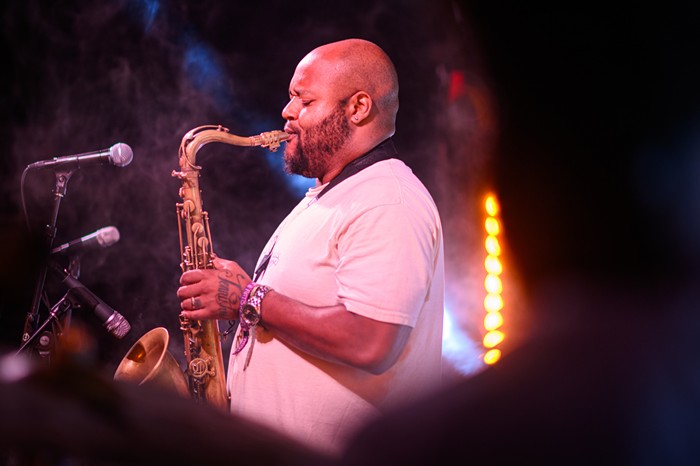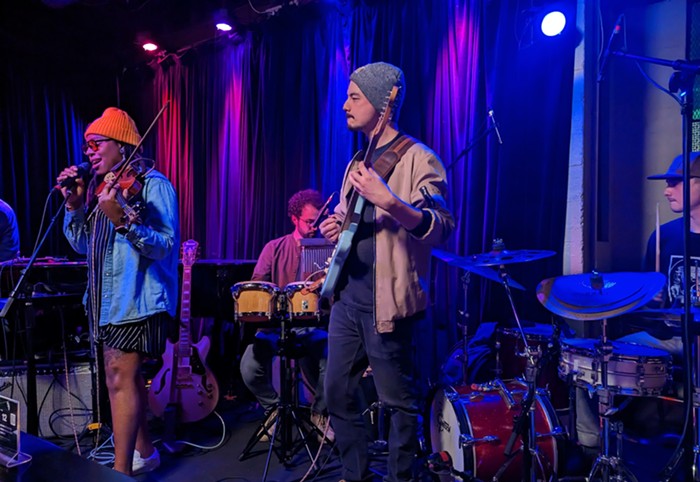FELA KUTI once called music a "weapon of the future."
"Music is the weapon of the progressives," said the Nigerian musician, political activist, and founder of Afrobeat. "Music is the weapon of the givers of life."
Nearly 20 years after his death, Kuti would be dismayed to find that music today is less a weapon for change than a tool for escapism and a celebration of consumerism. Protest music of any real substance has become a thing of the history books, though it's arguably needed today as much as ever. Even with what's currently happening in places like Ferguson and Staten Island and Baltimore, America has been lacking a soundtrack to fuel the building movement against social oppression, cultural complacency, and police violence against African American men.
"The US has sustained a systemic attack on black organizing for hundreds of years," says Ryan Mahan, bassist for Algiers, on the phone from Brooklyn. "And by the 1980s you see real destruction of political militancy... But we're seeing it emerging again, and it's emerging in the spirit of some of the earlier, more militant organizations that were focused not only on militancy and left-wing alternatives, but also on delivering to their local communities, and providing service where the government doesn't provide, or where the economy has destroyed the community."
Algiers are a radical band—not only in their politics, but in their music, which is the aural equivalent of an uprising in the making (appropriate for a band whose namesake is the site of one of history's most influential anti-colonial campaigns). Mahan, guitarist Lee Tesche, and vocalist Franklin James Fisher (Fisher is African American; Mahan and Tesche are white) originally met in Atlanta and realized they each shared complicated relationships with the American South, as well as a shared discontent with the status quo of music and activism. After recording two limited-release singles in 2011 and 2013, Algiers were picked up by Matador Records in January 2014, and began composing the songs that would make up their self-titled debut album.
"We'd been working on these songs—some recent, some for many years—demoing them, sending them back and forth," says Tesche from Fisher's Brooklyn apartment. "We had composed [our parts] separately, and then began working on them together, collectively. We went to the studio and re-recorded every part, from the ground up, and there was a lot of writing within the studio, as well."
The music on Algiers is dystopian, lyrically and sonically. With an arsenal of multi-tracked guitars, hand clapping, foot stomping, drum programming, and collective shouting, the 11-song album is as much a call to arms as it is a call for personal accountability. It fuses the post-punk of Gang of Four, the groove of TV on the Radio, and the Biblical fury of early Bad Seeds. Critics often make much of Algiers' gospel influence, but if they do play gospel, it's the gospel of Revelations—of fire and brimstone, the prophesying of the destruction of Babylon.
"Blood" has echoes of Odetta, of field hollers and chain gangs. It is the sound of the blues, when the blues were still the music of anguish and struggle, not entertainment for paunchy white men at summer festivals.
"Four hundred years of torture/Four hundred years a slave," Fisher sings.
"Dead just to watch you squander
Just what we tried to save
Now death is at your doorstep
And you're still playing games
So drown in entertainment
'Cause all our blood is in vain."
"When the blues were sold back to the American public through the British Invasion," Fisher says, "once you have these white bands covering black music, then all of a sudden it became art or it became acceptable. But you have to always remember this is something that is constantly happening—this co-opting, this repackaging of black art. We are always very cognizant of who may or may not be listening, and at the same time we are speaking directly to people who may misconstrue—deliberately or inadvertently—things that we are trying to say or get across. But there is a very large difference between a black artist who [has been] co-opted by the capitalist culture, and a black artist that is actually saying something that is trying to build up and reinforce identity politics in the face of oppression."
"When you're attempting to communicate with people through music, through art, through political discourse," Mahan adds, "there's also a sense of trust. You trust people to interpret that message and take away what they will. That's the whole part about organizing and mobilizing and communicating. Fundamentally, there has to be that sense of trust."
After touring with Interpol earlier this year, Algiers' enlisted Bloc Party drummer Matt Tong for their current headlining tour through the States. The tour, and the deserved attention Algiers has earned, has been gratifying for the band.



















